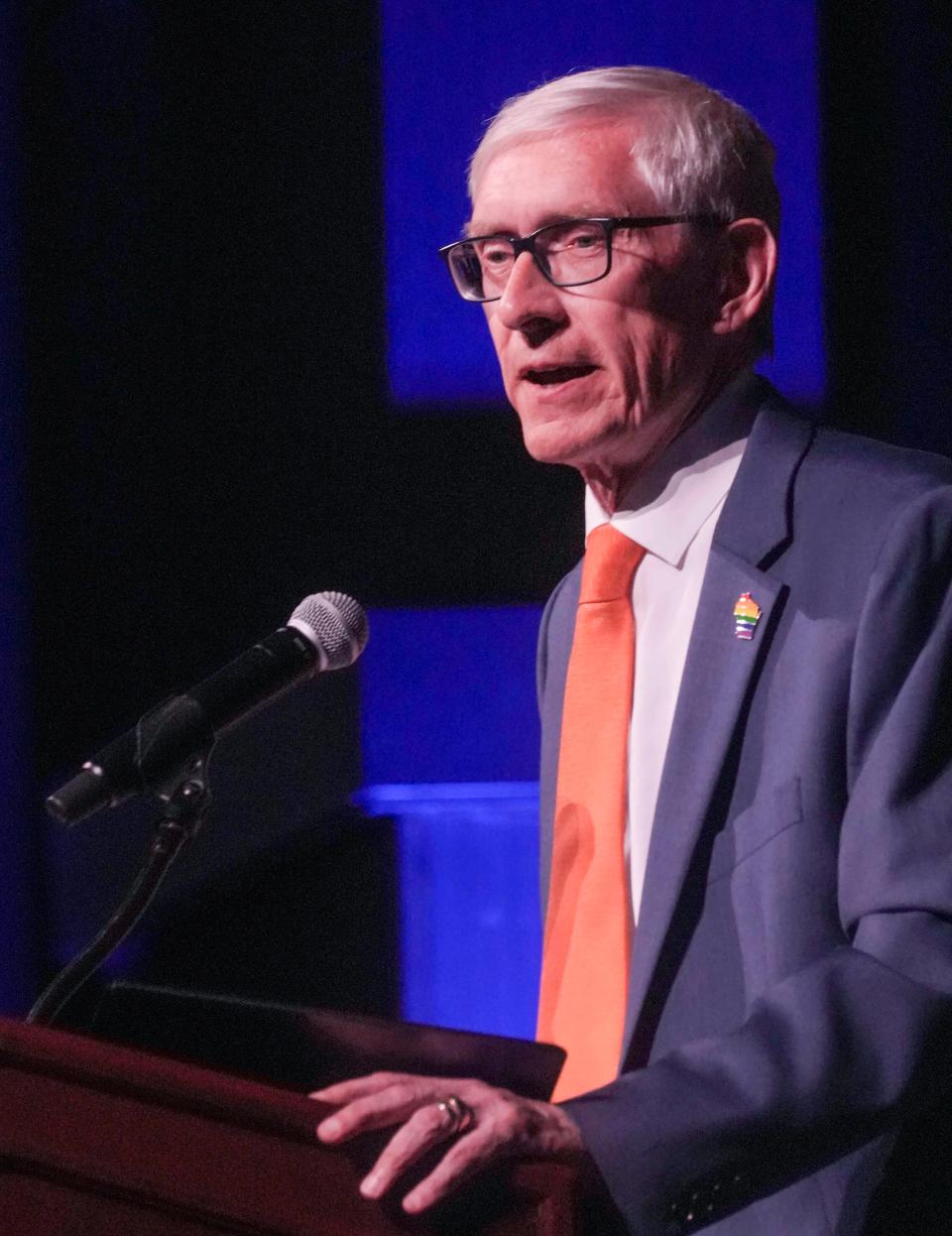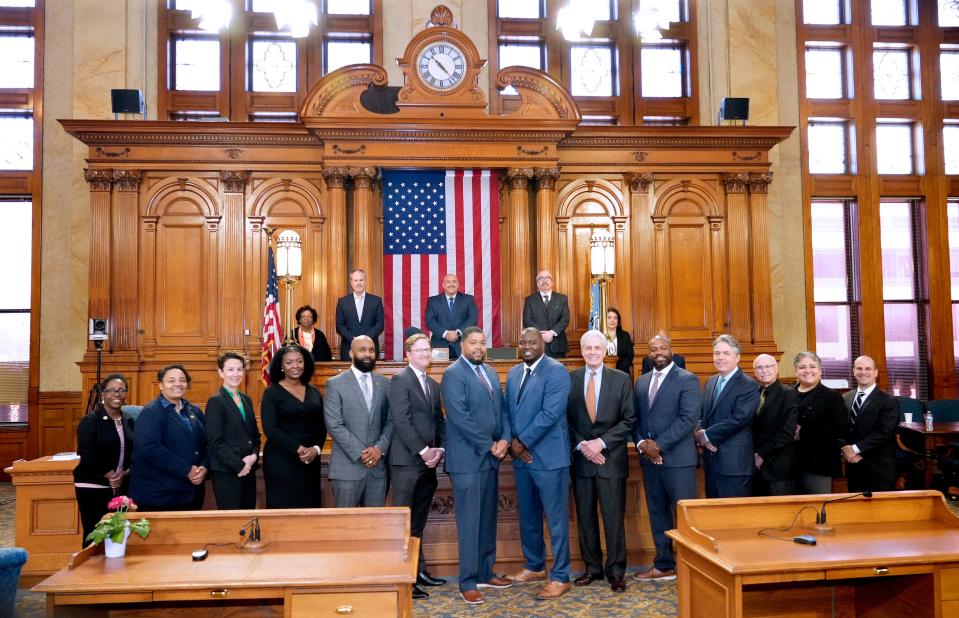When will I start paying a sales tax in Milwaukee and Milwaukee County? What we know.
- Oops!Something went wrong.Please try again later.
Gov. Tony Evers' signature is all that stands between elected leaders at the City of Milwaukee and Milwaukee County and their ability to vote on long-sought local sales taxes.
And while some on the Common Council and County Board of Supervisors argue that voters should be the ones making the decision on new taxes, the responsibility landed squarely on the local elected leaders' shoulders when the state Legislature on Wednesday passed a sweeping bill that requires two-thirds votes of each body to put those taxes in place.
The deal struck between the Democratic governor and legislative Republicans would allow Milwaukee County to add a 0.4% sales tax to its current 0.5% sales tax, for a total county sales tax of 0.9%. The city can pursue a 2% sales tax.
The state Legislative Fiscal Bureau estimates the new sales tax would generate an additional $80 million for Milwaukee County in the first year. State estimates project the sales tax could offer the city an annual revenue boost of $193.6 million.
The bill's passage came after an agreement announced last week by Republican legislative leaders and Evers to allow Milwaukee and Milwaukee County to implement sales taxes by two-thirds votes of the council and county board instead of letting voters decide via referendum.
Sending the decision to the Common Council and County Board shifts the timeline that would have been in place had the original referendum requirement remained in the bill.
Here's what you need to know about how soon a sales tax could be in place — and the steps needed to make that happen.
What happens next?

Before anything else can happen, Evers must sign the bill.
He signaled he was pleased with the jointly negotiated legislation in a tweet Wednesday night.
It’s my job as governor to always work to do the right thing when it matters most.
We’re securing over $1 billion for our kids and our schools to improve reading and kids’ mental health while making historic investments in our communities. This is a win for Wisconsin. https://t.co/kZ2dyqjXib— Governor Tony Evers (@GovEvers) June 15, 2023
After Evers signs the bill, when will the Common Council and County Board vote?
That's not entirely clear, though the city seems to have a less ambiguous timeline.
The council could take up legislation on a sales tax as soon as next cycle, which begins after Tuesday's Common Council meeting.
The council has two scheduled meetings in July before it breaks for its August recess: July 11 and July 31. A final vote could take place either of those days.
Two-thirds of the council, or 10 of the 15 members, must vote in favor of the sales tax for it to go into effect.
Mayor Cavalier Johnson, who has been deeply involved in the state negotiations and pushed for the sales tax legislation, would then need to sign it.
At this point, it remains unclear when the County Board might take up legislation on the additional sales tax, board spokesman Eddie Cullen told the Journal Sentinel.
That includes whether the board would take a vote before its own August recess. The board has a single cycle before the August recess, with a meeting on July 27.
Cullen said some supervisors are wanting to vote quickly while others are still talking with constituents and considering how to vote.
Twelve of the board's 18 members would have to vote in favor to implement the tax.
Sept. 3 is the latest the County Board could vote to implement a sales tax for the county to start collecting the revenue Jan. 1, 2024, according to County Executive David Crowley's office.
Crowley, who was also deeply involved in pushing the state legislation forward, would then sign it.
If the sales taxes get local approval, how soon would they go into effect?
Additional steps are required before a sales tax could go into place.
A key step comes at the state level.
“First, the Wisconsin Department of Revenue needs at least several months to activate and confirm the flow of money,” said Jeff Fleming, Johnson's spokesman.
The bill requires a four-month lead-time before the tax goes into effect.
"A certified copy of the ordinance shall be delivered to the secretary of revenue at least 120 days prior toits effective date," the bill states.
It allows the sales taxes to go into effect on Jan. 1, April 1, July 1 or Oct 1.
Comptrollers at both the city and county would also have to certify the revenue.

Does it matter when a sales tax goes into effect?
Financially — and politically — yes.
The city and county are each facing challenging 2024 budgets and fiscal "cliffs" in 2025.
For the city in 2025, that means deep cuts in services when pandemic aid runs out. For the county, it means a "transit cliff" in which the bus system would be grappling with a nearly $26 million budget deficit by that year.
Because each of the local governments adopt their annual budgets in the fall of the preceding year, that means local leaders will be wrestling with their 2024 budgets in a matter of months.
But there's another reason local sales taxes would matter next year: the 2024 Republican National Convention.
The convention will take place in Milwaukee from July 15-18, 2024, bringing an influx of visitors and spending on which Milwaukee and Milwaukee County could capitalize with sales taxes.
The RNC isn't the only political reason the timing of the sales taxes matter.
Johnson and Crowley will be up for re-election early next year.
More: State Rep. David Crowley announces run for Milwaukee County executive
More: Milwaukee's pension spike is coming fast. Here's how the mayoral candidates would deal with it.
Both men made resolving the city's and county's financial challenges cornerstones of their campaigns for their current seats. And once in office, they have invested significant time and resources from their respective administrations into reaching an agreement with the state.
The votes at the council and County Board are big hurdles they still must overcome to make good on that promise.
A spring primary, if enough candidates enter each race, will be held Feb. 20. The spring election will be April 2.
How could this timeline have played out differently with a referendum?
It would have been a much different timeline.
Fleming told the Journal Sentinel in the weeks before Wednesday's vote, when a referendum requirement remained in the legislation, that it was not clear when a referendum would be scheduled but that it would be a number of months after the governor signed off. Then there would be additional steps, including at the state Department of Revenue.
Bob Lang, director of the state Legislative Fiscal Bureau, said the earlier Assembly version of the bill did not specify when a referendum would be held.
He said local governments by statute must hold a spring primary or general election in addition to partisan primary elections and fall general elections. Municipalities are required to pay the costs of these statutorily required elections.
A referendum could also have been held at a special election but would have incurred additional costs beyond the statutorily required elections.
“If the city passes an ordinance imposing the tax, the city must file a petition for referenda a minimum of 70 days prior to the election at which point the question will appear on the ballot,” Lang said. “If the taxes are approved by the city electors at referenda, the City must provide a certified copy of the ordinance at least 120 days prior to the effective date of the tax, and the tax could first be imposed on the start of a calendar quarter.”
Patricia A. Mayers, state Department of Revenue director of communications, cited sections of Assembly bill and said a special referendum could be held at any time after bill passage, assuming proper notice is given by the city or county as provided under Wisconsin statutes.

Need more help with voting questions? The Milwaukee Resource Guide is here to help. Have something you want answered? Submit a question.
Our subscribers make this reporting possible. Please consider supporting local journalism by subscribing to the Journal Sentinel at jsonline.com/deal.
DOWNLOAD THE APP: Get the latest news, sports and more
This article originally appeared on Milwaukee Journal Sentinel: Here's how Milwaukee, Milwaukee County could launch sales taxes

